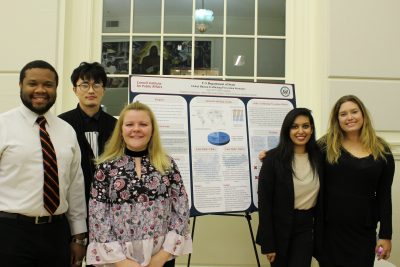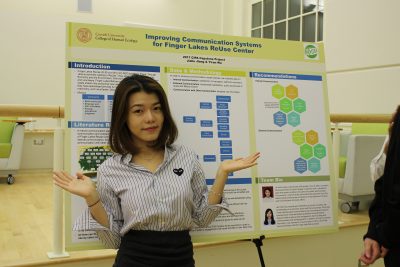People who choose to attend a professional program have a reasonable expectation of graduating with the skills to move directly into a professional career. We realize this and work hard to build a wide variety of experiential learning experiences into our curriculum. Our Capstone program is one example of this. The program was designed to help you solidify your policy acumen and enhance your consulting toolkit by putting you to work with real-world clients. Over the course of a semester, you learn project management, evaluation, teamwork, and leadership skills while engaged in a meaningful project.
Interested in the work that current students have been doing? The listing below includes a sampling of Fall 2017 Capstone Clients and Projects. You will find additional case studies on the CIPA website.
 U.S. Department of State (DOS)
U.S. Department of State (DOS)
For this project, five CIPA students conducted research for the Department of State’s (DOS) Office to Monitor and Combat Trafficking in Persons. The Office leads the DOS’s global efforts to combat modern slavery through the prosecution of traffickers, the protection of victims and prevention through diplomacy, foreign assistance, capacity building, and policy coordination among other means. Recognizing the narrow scope and limited success of implemented prevention methods, namely awareness-raising campaigns, the Office was interested in research on other crime prevention models that could produce more positive outcomes.
The consulting team conducted an extensive review of best practices in trafficking prevention including wildlife, narcotics and arms trafficking that may be applicable to human trafficking prevention. The team identified new and innovative anti-trafficking models and successful prevention policies and assessed if these could be applicable to other countries’ efforts to more effectively combat human trafficking. Interviews with experts from international organizations provided strong insights for their findings. Lastly, two in-depth case studies on Turkey and China provided a realistic look into the current human trafficking situation, details of national policies and specifics of policy implementation.
A CIPA Capstone team worked with Humanity Crew, a small NGO based in Galilee and Greece, which is dedicated to the psychosocial support of refugees fleeing the Syrian crisis. Humanity Crew is well-positioned to meet needs with a group of psychiatrists, psychologists and mental health professionals who also come from a similar social and cultural background as the refugees and are fluent in Arabic. Humanity Crew was interested in the application of guidelines for mental health and psychosocial support services (MHPSS) by other refugee aid organizations, the challenges they face, and recommendations for new and improved guidelines.
The capstone team conducted a study on MHPSS practices using interviews with practitioners, published guidelines, protocols, handbooks, and internal documents from organizations including the Inter-Agency Standing Committee and United Nations High Commission for Refugees. The team also administered a survey. These studies yielded substantial information regarding guidelines and their proposed implementation procedures. Lastly, the team produced detailed recommendations for each stage of the refugee engagement process based on the in-depth research the members had conducted.
 U.S. Government Accountability Office
U.S. Government Accountability Office
As an independent and nonpartisan agency, the U.S. Government Accountability Office (GAO) is tasked with helping to improve the performance and ensure the accountability of the federal government. A CIPA Capstone team, in consultation with the GAO, considered the potential impact of the Financial CHOICE Act, a major piece of legislation that aims to provide regulatory relief to banking organizations by providing an “off-ramp”, or exempting financial institutions, from certain regulations outlined in the 2010 Dodd Frank Act. The team focused on three research questions: eligibility requirements for the “off-ramp” regulatory exemption; potential benefits; and potential costs; such as risks to safety and soundness, inconsistent regulation and market inefficiencies, and decreased access to capital.
The team compiled data on bank holding companies and insured depository institutions to present an overview of institutions likely to be impacted by this piece of legislation. They conducted data analysis to determine the average capital that banks of various sizes would need to raise to be eligible for the “off-ramp”. The team also investigated potential impacts on compliance costs, banking activities, and expenditures on administration and regulation, as well as potential costs to both banking organizations and financial regulatory agencies.
Finger Lakes ReUse (FLR) is a local non-profit organization working to enhance community, economy and environment through reuse – redirecting materials destined for the waste stream into productive new uses. The organization is growing rapidly and expanding their services with goals to expand to other regions. A capstone team developed recommendations for improving FLR’s internal and external communications priorities.
The Capstone team conducted interviews and surveys with FLR leadership, managers, staff, volunteers, current customers and potential customers to understand and assess strengths and weaknesses in FLT’s current internal and external communications systems. They also gathered information about awareness of reuse and new potential markets and retail sites in the area. The team recommended: improvements to internal and external information systems and communication; methods to further develop donor relationships; and next steps for partnering with local government entities.


